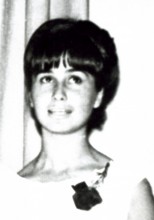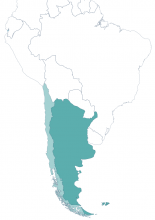Frida Laschan Mellado- nicknamed "la Gringa"- was born in Chile on 10th August 1947 to a family of professionals. Her father was the manager of Citroën in Arica, a city near the northern Chilean-Peruvian border. She spent her childhood in the neighbourhood of Ñuñoa in Santiago before her mother passed away and she had to continue her secondary education at a boarding school.
She trained as a nursery school teacher before working at the Agrarian Reform Corporation's Institute for Rural Capacitation (CORA) in Lautaro city in Chile's southern Araucanía region. There, she became a militant for the Socialist Party.
During her fieldwork, Frida met her partner, Ángel Omar Athanasiu Jara: a young Chilean-Argentine who studied agronomy in Temuco city and was an active militant of the Movimiento de Izquierda Revolucionaria (National Liberation Movement, MIR). From 1972, he carried out political work in the Mapuche indigenous communities of Lautaro, where Frida also joined the MIR.
When the Chilean coup d'état hit on 13th September 1973, Frida was a civil servant for the CORA in Lautaro. Military police officers (Carabineros) in Lautaro arrested Frida and took her to their headquarters before she was tried by the Military Prosecutor's Office.
Thanks to her father's efforts, Frida was released and headed for Santiago, where she was arrested again and sent to the capital's prison. Frida was then transferred back to Lautaro and the military justice system absolved her of all charges.
On both occasions, Frida was submitted to interrogations, during which the officers insisted on asking her about her partner, Ángel. At the time, Ángel had gone into hiding and was being pursued by the Chilean intelligence agency, the Dirección Nacional de Inteligencia (Directorate of National Intelligence, DINA), and the country's military authorities.
Given her continued persecution, Frida was forced to move to Argentina, where she initially settled with her exiled husband in Buenos Aires in March 1974 and later moved down south to the city of San Martín de los Andes in Neuquén province during early 1975.
During his exile in Argentina, Ángel continued his political activities within the MIR and became involved in the Junta de Coordinación Revolucionaria (Revolutionary Coordinating Junta, JCR), where he was known by the pseudo-name 'Germán'. Frida also returned to political militancy by joining the JCR.
The couple found out through their family in Chile that they were being monitored by the Carabineros. Both Ángel and Frida- who had fallen pregnant- decided to return to Buenos Aires, where their son, Pablo Germán Atanasiu Laschan was born on 29th October 1975.
Shortly after the Argentine coup d'état, the family fell victim to a security forces operation aimed at MIR members in Argentina. Frida was 29 years old, Ángel was aged 22, and Pablo was just five months old when they were captured in their Buenos Aires home. Frida and Ángel remain disappeared, and baby Pablo was a victim of illegal appropriation. The same planned attack led to the kidnapping of the Brazilian Jorge Alberto Basso, who was also a MIR militant.
Since the kidnapping of Ángel, Frida, and Pablo, the Athanasiu and Laschan families filed various reports, habeas corpora, and even travelled to Buenos Aires to uncover the whereabouts of the disappeared young people and their baby. They incessantly searched prisons, asylums, and orphanages. Pablo was registered as the son of the Argentine Federal Police Inspector Enrique Andrés López and his wife, Carmen Clementina Saunier, on 7th June 1976 under the name 'Carlos Andrés López'.
Pablo finally recovered his identity in August 2013 thanks to the diverse efforts of his family and the Abuelas de Plaza de Mayo (Grandmothers of May Square). The Buenos Aires Federal Criminal Court No.1 hearing, led by judge María Romilda Servini de Cubría, was particularly instrumental in investigating Pablo's disappearance. Pablo was registered as the stolen 'grandchild 109' before he passed away in Buenos Aires on 12th April 2015.
The disappearance of Frida and her family was investigated by the Argentine judiciary system through the megacausa, or large criminal proceeding, on Operation Condor. The Buenos Aires Federal Criminal Court No.1 condemned 15 defendants on 27th May 2016, including Santiago Riveros, Manuel Cordero Piacentini, and Reynaldo Bignone.
The tribunal linked the crimes suffered by Frida Laschan and her family to the coordinated repression between the Chilean and Argentine security forces aimed at provoking the disintegration of the MIR following the MIR leader Edgardo Enríquez's arrest on 10th April 1976.


